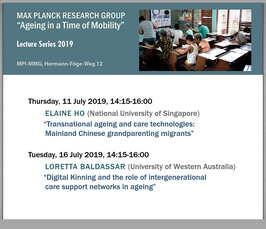"Transnational ageing and care technologies: Mainland Chinese grandparenting migrants"
Max Planck Research Group “Ageing in a Time of Mobility” Lecture Series 2019
- Datum: 11.07.2019
- Uhrzeit: 14:15 - 16:00
- Vortragende(r): Elaine Ho (National University of Singapore) and Tuen Yi Chiu
- Elaine Lynn-Ee Ho is Associate Professor at the Department of Geography and Senior Research Fellow at the Asia Research Institute (ARI), National University of Singapore. She is also Assistant Dean (Research Division) at the Faculty of Arts and Social Sciences. Her research addresses how citizenship is changing as a result of multi-directional migration flows in the Asia-Pacific. She is author of Citizens in Motion: Emigration, Immigration and Re-migration Across China’s Borders (2019; Stanford University Press). Her current research focuses on two domains: first, transnational ageing and care in the Asia-Pacific; and second, im/mobilities and diaspora aid at the China-Myanmar border. Elaine is Section Editor of the International Encyclopedia of Human Geography (2nd edition), Editor of the journal, Social and Cultural Geography, and serves on the journal editorial boards of Citizenship Studies; Emotions, Society and Space; and the Singapore Journal of Tropical Geography.
- Ort: MPI-MMG, Hermann-Föge-Weg 12, Göttingen
- Raum: Conference Room

For more details please contact menster(at)mmg.mpg.de.
Transnational
ageing is an understudied topic compared to the attention that has been given
to other aspects of transnational familyhood. This presentation focuses
on grandparenting migrants from the People’s Republic
of China who move temporarily to Singapore or Sydney to care for grandchildren
and/or to receive care. Rather than “ageing in place”, they are charting
transnational journeys of ageing by recreating social networks and social
spaces abroad. Using WeChat, an ICT tool, they maintain social ties in China
while also building new social connections abroad. Our presentation introduces
the concept of “care technologies”, referring to two dimensions: first, in the
Foucauldian sense of how technologies of subjectification are evinced in and
through care relations; and second, the role that ICT tools play in mediating
care relations across borders, exhibiting governmentality effects too. The
presentation also shares insights on integrating qualitative research methods
with Geographic Information Science (GIS) visualisations to extend
understanding of the spatial and temporal care routines of the grandparenting
migrants, as well as the “throwntogether” spaces which they share with older
Singaporeans as they age abroad.